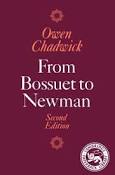And have dipped into one a few times:
According to the obituary article in The Telegraph:
The Reverend Professor Owen Chadwick, OM, who has died aged 99, was a clergyman-academic of a kind once common in universities but now very rare; the holder successively of Cambridge University’s chairs of both Ecclesiastical and Modern History, he was a leading authority on the history of religion and the churches.
The greater part of his career was devoted to the study of post-Reformation history, particularly the English Church, state and society since the industrial and French revolutions.
His single biggest publication, The Victorian Church – published in two parts in 1966 and 1971 – was a gigantic survey of religious life in Britain in the 19th century, exploring the social and intellectual developments which lay behind the waning power of religion in the Victorian period.
Although it was based on a quite astonishing range of research, The Victorian Church was – typically for Chadwick – essentially a personal interpretation. It showed less interest in dissent than in the establishment, less liking for evangelicals than for the Oxford Movement, and less love for town than for country. If some critics accused him of lack of balance, they were unable to fault his analysis of the politics of established churchmanship.
Nor could they fault his prose style. For Chadwick was no dry-as-dust historian; he always preferred to tell a story to explore a situation or illustrate a point. The Victorian Church was enlivened by a wealth of vivid detail: Queen Victoria trying to slip a favourite preacher into a bishopric; a Dorset parishioner complaining that his astronomy-minded rector kept “a horoscope top o’ his house to look at the stares and sich”.
Although he wrote extensively on the relationship between the Christian denominations, Chadwick’s strength lay in his sympathetic understanding of the spiritual and social foundations of the Church of England.
He always wrote most warmly about the country clergy and, as he put it, their “reasonable, quiet, unpretentious, sober faith in God and way of worship”. The history of the English Church, he believed, was made not only by the decisions of the great at Lambeth or Westminster or in debates at Oxford, but by the convictions of obscure country parsons in Lincolnshire.
May he rest in peace. David Warren wrote an appreciation of Chadwick for The Catholic Thing.







No comments:
Post a Comment